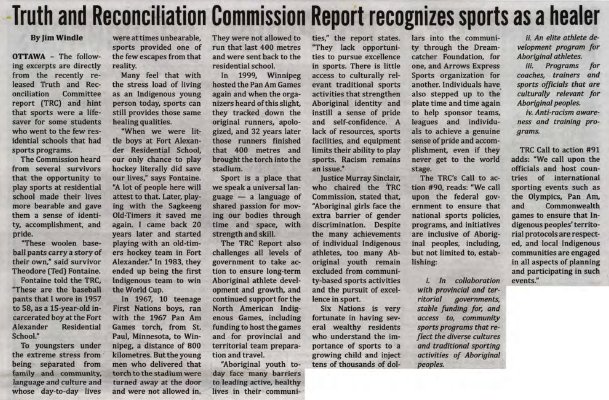"Truth and Reconciliation Commission Report recognizes sports as a healer"
- Publication
- Turtle Island News, 3 Feb 2016
- Full Text
- Truth and Reconciliation Commission Report recognizes sports as a healerBy Jim Windle
OTTAWA - The following excerpts are directly from the recently released Truth and Reconciliation Committee report (TRC) and hint that sports were a lifesaver for some students who went to the few residential schools that had sports programs.
The Commission heard from several survivors that the opportunity to play sports at residential school made their lives more bearable and gave them a sense of identity, accomplishment, and pride.
"These woolen baseball pants carry a story of their own," said survivor Theodore (Ted) Fontaine. Fontaine told the TRC, "These are the baseball pants that I wore in 1957 to 58, as a 15-year-old incarcerated boy at the Fort Alexander Residential School."
To youngsters under the extreme stress from being separated from family and community, language and culture and whose day-to-day lives were at times unbearable, sports provided one of the few escapes from that reality.
Many feel that with the stress load of living as an Indigenous young person today, sports can still provides those same healing qualities.
"When we were little boys at Fort Alexander Residential School, our only chance to play hockey literally did save our lives," says Fontaine. "A lot of people here will attest to that. Later, playing with the Sagkeeng Old-Timers it saved me again. I came back 20 years later and started playing with an old-timers hockey team in Fort Alexander." In 1983, they ended up being the first Indigenous team to win the World Cup.
In 1967, 10 teenage First Nations boys, ran with the 1967 Pan Am Games torch, from St. Paul, Minnesota, to Winnipeg, a distance of 800 kilometres. But the young men who delivered that torch to the stadium were turned away at the door and were not allowed in. They were not allowed to run that last 400 metres and were sent back to the residential school.
In 1999, Winnipeg hosted the Pan Am Games again and when the organizers heard of this slight, they tracked down the original runners, apologized, and 32 years later those runners finished that 400 metres and brought the torch into the stadium.
Sport is a place that we speak a universal language - a language of shared passion for moving our bodies through time and space, with strength and skill.
The TRC Report also challenges all levels of government to take action to ensure long-term Aboriginal athlete development and growth, and continued support for the North American Indigenous Games, including funding to host the games and for provincial and territorial team preparation and travel.
"Aboriginal youth today face many barriers to leading active, healthy lives in their communities," the report states. "They lack opportunities to pursue excellence in sports. There is little access to culturally relevant traditional sports activities that strengthen Aboriginal identity and instill a sense of pride and self-confidence. A lack of resources, sports facilities, and equipment limits their ability to play sports. Racism remains an issue."
Justice Murray Sinclair, who chaired the TRC Commission, stated that, "Aboriginal girls face the extra barrier of gender discrimination. Despite the many achievements of individual Indigenous athletes, too many Aboriginal youth remain excluded from community-based sports activities and the pursuit of excellence in sport.
Six Nations is very fortunate in having several wealthy residents who understand the importance of sports to a growing child and inject tens of thousands of dollars into the community through the Dreamcatcher Foundation, for one, and Arrows Express Sports organization for another. Individuals have also stepped up to the plate time and time again to help sponsor teams, leagues and individuals to achieve a genuine sense of pride and accomplishment, even if they never get to the world stage.
The TRC's Call to action #90, reads: "We call upon the federal government to ensure that national sports policies, programs, and initiatives are inclusive of Aboriginal peoples, including, but not limited to, establishing:
- In collaboration with provincial and territorial governments, stable funding for, and access to, community sports programs that reflect the diverse cultures and traditional sporting activities of Aboriginal peoples.
- An elite athlete development program for Aboriginal athletes.
- Programs for coaches, trainers and sports officials that are culturally relevant for Aboriginal peoples.
- Anti-racism awareness and training programs.
TRC Call to action #91 adds: "We call upon the officials and host countries of international sporting events such as the Olympics, Pan Am, and Commonwealth games to ensure that Indigenous peoples' territorial protocols are respected, and local Indigenous communities are engaged in all aspects of planning and participating in such events."
- Creator
- Windle, Jim, Author
- Media Type
- Text
- Newspaper
- Item Type
- Clippings
- Publisher
- Turtle Island News
- Place of Publication
- Six Nations of the Grand River, ON
- Date of Publication
- 3 Feb 2016
- Subject(s)
- Personal Name(s)
- Fontaine, Theodore (Ted) ; Sinclair, Murray.
- Corporate Name(s)
- Truth and Reconciliation Commission ; Dreamcatcher Foundation ; Arrows Express.
- Local identifier
- SNPL004759v00d
- Language of Item
- English
- Geographic Coverage
-
-
Ontario, Canada
Latitude: 45.42094 Longitude: -75.69029
-
- Creative Commons licence
 [more details]
[more details]- Copyright Statement
- Public domain: Copyright has expired according to Canadian law. No restrictions on use.
- Copyright Date
- 2016
- Copyright Holder
- Turtle Island News
- Contact
- Six Nations Public LibraryEmail:info@snpl.ca
Website:
Agency street/mail address:1679 Chiefswood Rd
PO Box 149
Ohsweken, ON N0A 1M0
519-445-2954




